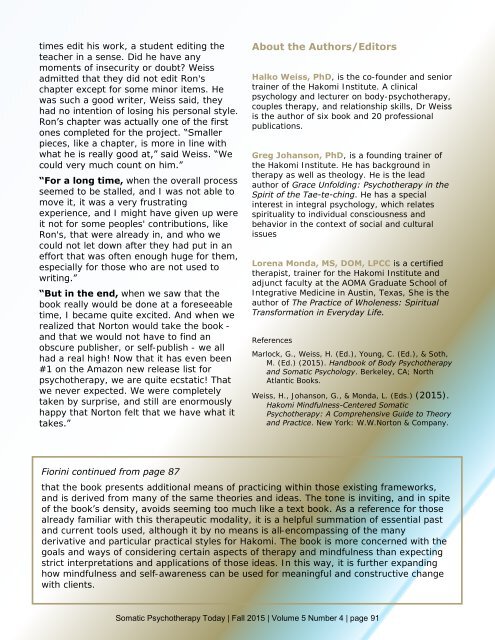Somatic Psychotherapy Today
1RCP3xp
1RCP3xp
Create successful ePaper yourself
Turn your PDF publications into a flip-book with our unique Google optimized e-Paper software.
times edit his work, a student editing the<br />
teacher in a sense. Did he have any<br />
moments of insecurity or doubt? Weiss<br />
admitted that they did not edit Ron's<br />
chapter except for some minor items. He<br />
was such a good writer, Weiss said, they<br />
had no intention of losing his personal style.<br />
Ron’s chapter was actually one of the first<br />
ones completed for the project. “Smaller<br />
pieces, like a chapter, is more in line with<br />
what he is really good at,” said Weiss. “We<br />
could very much count on him.”<br />
“For a long time, when the overall process<br />
seemed to be stalled, and I was not able to<br />
move it, it was a very frustrating<br />
experience, and I might have given up were<br />
it not for some peoples' contributions, like<br />
Ron's, that were already in, and who we<br />
could not let down after they had put in an<br />
effort that was often enough huge for them,<br />
especially for those who are not used to<br />
writing.”<br />
“But in the end, when we saw that the<br />
book really would be done at a foreseeable<br />
time, I became quite excited. And when we<br />
realized that Norton would take the book -<br />
and that we would not have to find an<br />
obscure publisher, or self-publish - we all<br />
had a real high! Now that it has even been<br />
#1 on the Amazon new release list for<br />
psychotherapy, we are quite ecstatic! That<br />
we never expected. We were completely<br />
taken by surprise, and still are enormously<br />
happy that Norton felt that we have what it<br />
takes.”<br />
About the Authors/Editors<br />
Halko Weiss, PhD, is the co-founder and senior<br />
trainer of the Hakomi Institute. A clinical<br />
psychology and lecturer on body-psychotherapy,<br />
couples therapy, and relationship skills, Dr Weiss<br />
is the author of six book and 20 professional<br />
publications.<br />
Greg Johanson, PhD, is a founding trainer of<br />
the Hakomi Institute. He has background in<br />
therapy as well as theology. He is the lead<br />
author of Grace Unfolding: <strong>Psychotherapy</strong> in the<br />
Spirit of the Tae-te-ching. He has a special<br />
interest in integral psychology, which relates<br />
spirituality to individual consciousness and<br />
behavior in the context of social and cultural<br />
issues<br />
Lorena Monda, MS, DOM, LPCC is a certified<br />
therapist, trainer for the Hakomi Institute and<br />
adjunct faculty at the AOMA Graduate School of<br />
Integrative Medicine in Austin, Texas, She is the<br />
author of The Practice of Wholeness: Spiritual<br />
Transformation in Everyday Life.<br />
References<br />
Marlock, G., Weiss, H. (Ed.), Young, C. (Ed.), & Soth,<br />
M. (Ed.) (2015). Handbook of Body <strong>Psychotherapy</strong><br />
and <strong>Somatic</strong> Psychology. Berkeley, CA; North<br />
Atlantic Books.<br />
Weiss, H., Johanson, G., & Monda, L. (Eds.) (2015).<br />
Hakomi Mindfulness-Centered <strong>Somatic</strong><br />
<strong>Psychotherapy</strong>: A Comprehensive Guide to Theory<br />
and Practice. New York: W.W.Norton & Company.<br />
Fiorini continued from page 87<br />
that the book presents additional means of practicing within those existing frameworks,<br />
and is derived from many of the same theories and ideas. The tone is inviting, and in spite<br />
of the book’s density, avoids seeming too much like a text book. As a reference for those<br />
already familiar with this therapeutic modality, it is a helpful summation of essential past<br />
and current tools used, although it by no means is all-encompassing of the many<br />
derivative and particular practical styles for Hakomi. The book is more concerned with the<br />
goals and ways of considering certain aspects of therapy and mindfulness than expecting<br />
strict interpretations and applications of those ideas. In this way, it is further expanding<br />
how mindfulness and self-awareness can be used for meaningful and constructive change<br />
with clients.<br />
<strong>Somatic</strong> <strong>Psychotherapy</strong> <strong>Today</strong> | Fall 2015 | Volume 5 Number 4 | page 91


